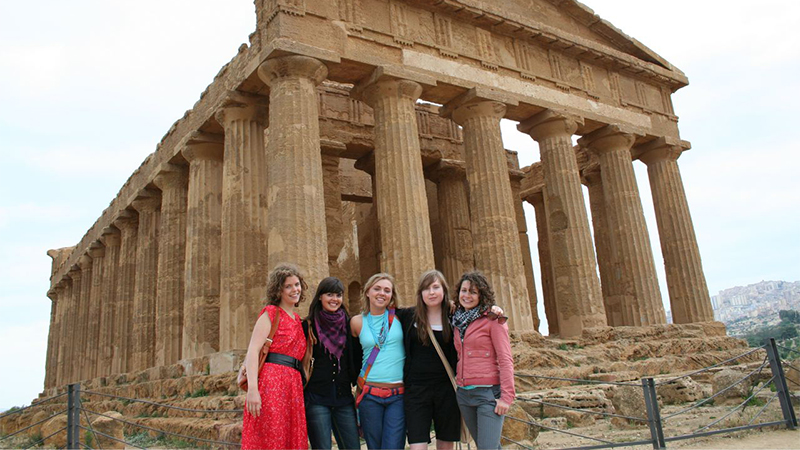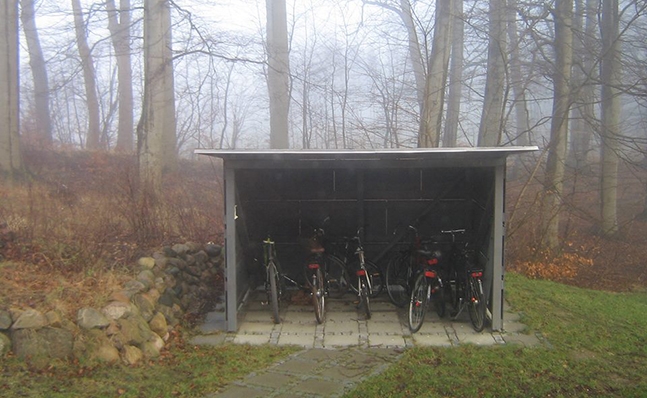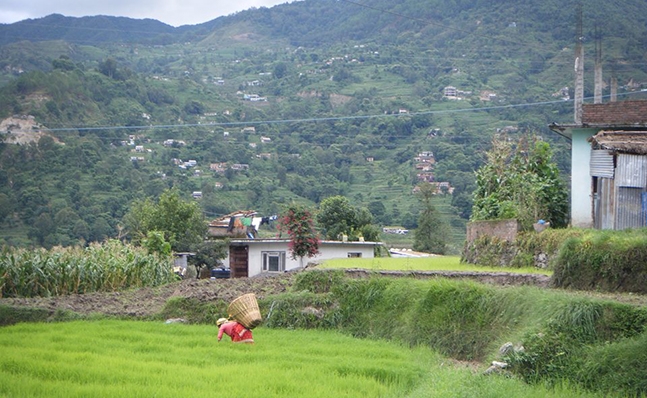While You’re Abroad

Welcome to your new home for study abroad! The information on this page is designed to help you settle in when you get to your destination. We hope your time abroad is a rewarding and wonderful experience, and our goal is to help you make the most of your experience. Whether you have questions regarding safety, sustainable travel or what it’s going to be like when you return to campus, we are here to help provide information, resources and advice.
Security Announcements
The U.S. Department of State has been issuing periodic “Worldwide Caution” public announcements since September 2001. These announcements underscore the importance for Americans living and traveling abroad to remain vigilant and security conscious.
Travel Advisories
Students are encouraged to check the travel advisories issued by the U.S. Department of State for their intended destination. Note that conditions can change rapidly at any time. We recommend that all travelers sign up to receive travel advisories and alerts.
We advise all students studying abroad to consult the U.S. State Department website on a regular basis. This site includes valuable information about countries throughout the world.
STUDENTS ABROAD U.S. EMBASSIES AROUND THE WORLD TRAVEL ADVISORIES EMERGENCIES ABROAD COUNTRY-SPECIFIC INFORMATION SMART TRAVELER ENROLLMENT PROGRAM (STEP) TRAVELER’S CHECKLIST
Rescinding Off-Campus Study Leave Status
Students on two-semester programs considering returning after one semester should see “Leaves of Absence” section of the Class Deans website. Students wishing to rescind their Study Abroad Leave should notify the Office for International Study and their Class Dean in writing. If a student rescinds their study abroad leave in order to register for classes in Northampton, that decision will be binding, and they will not be eligible to have off-campus study status reinstated.
Leave may be rescinded until the first day of classes each semester, however, the student is responsible for any non-refundable fees and deposits already paid to the study abroad program or host university on her behalf. The student is also responsible for contacting Housing to request a room.
A student who withdraws from a study abroad program or host university after the program has started is responsible for any non-refundable fees and withdrawal fees charged by the study abroad program; they are also normally withdrawn from Smith and may not return to the college the following semester.
Extending Leave
Students approved for study abroad for one semester who want to extend their study abroad experience into the following semester should contact the Office for International Study to discuss their options.
For Smith Programs Abroad
Students who studied abroad in Florence, Hamburg, Geneva or Paris will be asked to complete a program evaluation that will be sent via email.
For Smith-Approved & Consortium Programs
All study abroad students who participated in a Smith consortium program or a Smith-approved program are required to submit an evaluation of their study abroad program to Smith at the conclusion of the program.
Students should complete the program evaluation that corresponds to the term studied abroad (fall, spring or academic year). Students who studied abroad on two different programs during the academic year should complete a program evaluation for each term and program (fall and spring).
Academic Year 2022-2023 Program Evaluation
Spring 2023 Program Evaluation
Please Note
Transcripts will not be forwarded to the registrar's office for posting until an evaluation is received by the Office for International Study.
Transcripts and grade reports from your program/university abroad must be sent directly to the Office for International Study:
Lewis Global Studies Center
5 Chapin Drive, Wright Hall 125
Northampton, MA 01063
Keep in mind that it may take a little time for your grades to appear on your academic record and on your transcript. If you have questions about transcripts or credits, please contact Associate Dean Lisa Johnson.
Please note: Transcripts will not be forwarded to the registrar's office for posting until a student's program evaluation is received by the Office for International Study.
For additional transcript and credit questions, see Credit Rules.
Returning to Smith
Few people anticipate culture shock when they return home, but many students actually find that it is just as challenging to get used to being home again as it was to get used to living abroad.
Some students find that they have changed and grown a great deal while abroad, but that home, family and friends have not. This gap makes it challenging to slip back into settings, routines and relationships that were once familiar and comfortable. You should expect a certain amount of this if you have had a full and enriching time overseas.
It is important not to ignore the return experience as a facet of study abroad: Readjusting to life at home is difficult and what you're feeling is entirely legitimate.
Common reentry experiences
- Impression that you can't fully explain your experience or its importance
- Realization that others do not want to hear very much about your adventures
- Sensation of being out of place despite being home
- Boredom with being home
- Experiencing reverse homesickness for the place where you studied abroad
- Seeing that relationships with family and friends have changed
- Feeling that others misunderstand your growth, or see the “wrong” changes in you
- Assessing your home in a way that is judgmental or overly critical
- Feeling that your experience abroad is lost or cut off from the rest of your life
Ways of Coping
If you find yourself experiencing difficulty after coming home:
- Try to use the same cultural adaptation skills that you developed while you were getting used to being abroad (that is, keep active, maintain a sense of humor, find a support group, expect differences, allow yourself to make mistakes, stay flexible) to make the transition to being home.
- Be reflective. Give some thought to your return, to the types of intellectual and emotional changes that you have undergone as a result of your time abroad.
- Expect some negative feelings about your home culture. Try not to be too critical of shortcomings that you did not see before. Remember that there are positive and negative aspects of all cultures—nothing is good or bad, it's just different.
- Accentuate the positive. Try to identify what you like about both cultures and try to incorporate the best aspects of these into your life.
- Be patient with your friends and family who are trying to understand your recent experiences. Listen to them, too, about the changes they underwent during the time you were away.
- Maintain connections with the international life through the many opportunities available at Smith: come to the Lewis Global Studies Center; evaluate your program; interact with the international student population from your study abroad location; help spread the word about study abroad to your friends and classmates; agree to talk to prospective students who are interested in the program through which you chose to study.
- Submit some of your favorite photos to the Global Encounters Photo Contest. We would love to see them!
- Set goals for your development. Realize once again that change can be stimulating and this could be your chance to develop in new directions. Set some long-term goals, which may involve finding ways to return abroad.
Reentry Resources
Austin, Clyde. "Cross-Cultural Re-entry: A Book of Readings." Abilene, Texas: Abilene Christian University Press, 1986.
Bruce, A. "Culture Shock at Home: Understanding Your Own Change – The Experience of Return." Transitions Abroad.January/February, 1997, p. 79–80.
Chisholm, Linda A. and Howard A. Berry. 2002. "Understanding the Education—and Through It the Culture—in Education Abroad." New York, NY. The International Partnership for Service-Learning.
Hogan, John T. "Culture-Shock and Reverse-Culture Shock: Implications for Juniors Abroad and Seniors at Home." Paper presented at the Annual Convention of the American College Personnel Association (Houston, TX, March 13–16, 1983).
Howell, Leah. "Coming Home: Sustaining the Experiences of Studying Abroad." The Vermont Connection. 1999.
Kauffman, Norman L., Martin, Judith N., and Weaver, Henry D. "Students Abroad: Strangers at Home." Yarmouth, Maine: Intercultural Press, 1992.
Kepets, Dawn. "Back in the USA: Reflecting on Your Study Abroad Experience and Putting it to Work." NAFSA: Association of International Educators, 1995.
Kohls, L. Robert. "Survival Kit for Overseas Living." Yarmouth, Maine: Intercultural Press, 1996.
Martin, Judith N. "Patterns of Communication in Three Types of Reentry Relationships: An Exploratory Study." Western Journal of Speech Communication. v50 n2 Spring 1986, p. 183–99.
Paige, R. Michael, Andrew D. Cohen, Barbara Kappler, Julie C. Chi and James P. Lassegard. Maximizing Study Abroad: A Student's Guide to Strategies for Language and Culture Learning and Use. Minneapolis, Minnesota: University of Minnesota, 2002.
Storti, Craig. 2001. "The Art of Coming Home." Yarmouth, ME. Intercultural Press, Inc.
Woody, Stacey. Programming for Reentry: Issues and Solutions for Study Abroad Returnees. Transitions Abroad. Mar/Apr 1998, p. 107–8.
"Welcome Home Stranger!" article by Alice Wu
"Reverse Culture Shock," article by Bill Hoffa
What's Up With Culture: Online cultural training resource for study abroad
Culture Matters (PDF): Online workbook developed for the Peace Corps for helping participants to acquire the skills and knowledge to work and live abroad successfully
It's Your World: Studyabroad.com's pre-departure handbook for students. Part V covers reentry.
The Center for Global Education: Reverse Culture Shock
Write About Your Own Experience
Part of the academic challenge of returning to campus is finding ways to bring the learning home. To demonstrate your new knowledge and educational perspective, we encourage you to consider:
Submitting proposals to present at conferences
- Smith in the World
- Celebrating Collaborations: Students and Faculty Working Together
- National Conferences on Undergraduate Research (NCUR) Annual undergraduate research conference held at a different institution each year draws 2,000 students and faculty members
- Kappa Omicron Nu Honor Society Undergraduate Research Community for Human Sciences holds an annual Leadership Institute and Undergraduate Research Conference
- Annual Biomedical Research Conference for Minority Students
Continuing your interest with a faculty member
Consider writing a departmental honors thesis or taking a Special Studies course with a faculty member who is doing research in your area of interest.
Sharing what you learned
You can share what you learned (and how things were different from Smith) by having discussions with your peers and classmates.
Attending Language Lunch Tables
Attend the Language Lunch Tables at noon in Duckett Special Dining Rooms (check the Smith calendar to see which languages meet which day).
Creating social change takes action. Put into action the new skills, attitudes and experiences you have gained abroad. This can take the form of developing an organization, deepening your civic engagement in a course or simply getting involved with already existing community service groups in the community.
Resources
Center for Community Collaboration: Supports student engagement in meaningful community service work and leadership training that enhances educational experience, meets community identified needs, provides opportunities for reflection and models the development of effective collaborative community partnerships with local nonprofit organizations.
Americans for an Informed Democracy: A nonpartisan organization that brings the world home to the next generation of leaders through educational seminars and conferences, leadership summits, town hall meetings, opinion pieces and global videoconferences.
Corporation for National & Community Service
Campus Compact: a national coalition of more than 1,100 college and university presidents representing some six million students dedicated to promoting community service, civic engagement and service-learning in higher education.
Idealist.org: a project of Action Without Borders, a nonprofit organization founded in 1995 with offices in the United States and Argentina. Idealist is an interactive site where people and organizations can exchange resources and ideas, locate opportunities and supporters and take steps toward building a world where all people can lead free and dignified lives.
Interested in work and volunteer opportunities abroad? Many options exist for students to find a way to gain new skills and strengthen their cross-cultural understanding outside of the classroom.
Work Abroad
You may wish to do only a short-term job such as teach English for a year or acquire a more long-term job, but whatever you choose, working abroad can be a very rewarding and enriching experience. Being immersed in a new culture brings a great deal of self-discovery and professional development not easily acquired at home.
Please note: Most countries require work visas, so be sure to do your research on what exactly you may need in order to work abroad.
Resources
BUNAC: Working Adventures Worldwide
University of Michigan: International Center
JET: teach English in Japan
Transitions Abroad: information on international internships
GoAbroad.com: intern, volunteer, teach or work abroad
Embassy.org: foreign embassies of Washington, D.C.
Work Abroad: The Complete Guide to Finding a Job Overseas, by Clayton A. Hubbs
International Jobs: Where They Are and How to Get Them, by Nina Segal, Eric Kocher
Work Worldwide: International Career Strategies for the Adventurous Job Seeker, by Nancy Mueller
Directory of Jobs & Careers Abroad (10th Ed), by Elisabeth Roberts
Best Resumes and CVs for International Jobs: Your Passport to the Global Job Market, by Ronald L. Krannich and Wendy S. Enelow
The Global Citizen: A Guide to Creating an International Life and Career, by Elizabeth Kruempelmann
Teach Abroad
GoAbroad.com: Teach abroad
TransitionsAbroad.com: Teaching K-12 and English abroad
Volunteer Abroad
Volunteer programs are rarely paid opportunities and may or may not be related to your field of study or academic focus. These positions do not generally require specific skill or previous experience, just a willingness to engage and give back. Academic credit is extremely rare for volunteer positions and may or may not be eligible for financial aid.
International Volunteer Programs Association
Additional Resources
Institute of International Education Passport (IIE): The IIE publishes some of the most comprehensive information on study and work abroad programs available anywhere and their site is one of the best places to start.
Transitions Abroad: Transitions Abroad magazine covers all education abroad options from work and study abroad to educational travel. The online version includes a comprehensive collection of in-depth information, including first-hand reports, annotated guides to resources and listings of programs, with excellent search capabilities.
U.S. Department of State: While not a directory of programs, this site provides essential information from the diplomatic branch of the U.S. government. The Department of State offers 1,000 internships annually as well as career positions.
Additional Resources
Registration When You Return to Smith
The Office of the Registrar will assist with credit and transcript questions.
View moreHousing When You Return to Smith
The Office of Residence Life can assist with housing and storage questions.
View moreLazarus Center for Career Development
Connect with Lazarus Center advisers to put your study abroad experience to work.
View moreFellowships
The Fellowships Office offers funded global and experiential education opportunities.
View moreGlobal Encounters
The Global Encounters Photo and Video Contests provide a venue for Smith students to share their global experiences with the Smith community. From Nepal to Croatia to Cuba, these images offer a unique view of the world.











